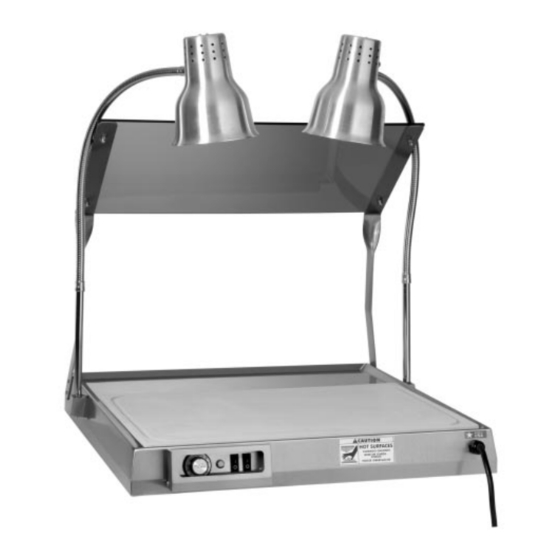AltoShaam MARINE 100-HSL/BCS-2S Manuale d'uso e manutenzione - Pagina 7
Sfoglia online o scarica il pdf Manuale d'uso e manutenzione per Apparecchiature di cottura AltoShaam MARINE 100-HSL/BCS-2S. AltoShaam MARINE 100-HSL/BCS-2S 17. Hot carving shelf

Chefs, cooks and other
specialized food service
personnel employ varied
methods of cooking.
Proper holding
temperatures for a
specific food product
must be based on the
moisture content of the
product, product density,
volume, and proper
serving temperatures.
Safe holding temperatures
must also be correlated
with palatability in
determining the length
of holding time for a
specific product.
Halo Heat maintains the
maximum amount of
product moisture content
without the addition of
water, water vapor, or
steam. Maintaining
maximum natural product
moisture preserves the
natural flavor of the
product and provides a
more genuine taste. In
addition to product
moisture retention, the
gentle properties of Halo
Heat maintain a
consistent temperature
throughout the cabinet
without the necessity of
a heat distribution fan,
thereby preventing
further moisture loss
due to evaporation
or dehydration.
G E N E R A L H O L D I N G G U I D E L I N E S
H O L D I N G T E M P E R A T U R E R A N G E
MEAT
BEEF ROAST — Rare
BEEF ROAST — Med/Well Done
BEEF BRISKET
CORN BEEF
PASTRAMI
PRIME RIB — Rare
STEAKS — Broiled/Fried
RIBS — Beef or Pork
VEAL
HAM
PORK
LAMB
POULTRY
CHICKEN — Fried/Baked
DUCK
TURKEY
GENERAL
FISH/SEAFOOD
FISH — Baked/Fried
LOBSTER
SHRIMP — Fried
BAKED GOODS
BREADS/ROLLS
MISCELLANEOUS
CASSEROLES
DOUGH — Proofing
EGGS —Fried
FROZEN ENTREES
HORS D'OEUVRES
PASTA
PIZZA
POTATOES
PLATED MEALS
SAUCES
SOUP
VEGETABLES
The holding temperatures listed are suggested guidelines only.
O & C M A N U A L • M A R I N E H O T C A R V I N G S H E L F
F A H R E N H E I T
C E L S I U S
140°F
60°C
160°F
71°C
160° — 175°F
71° — 79°C
160° — 175°F
71° — 79°C
160° — 175°F
71° — 79°C
140°F
60°C
140° — 160°F
60° — 71°C
160°F
71°C
160° — 175°F
71° — 79°C
160° — 175°F
71° — 79°C
160° — 175°F
71° — 79°C
160° — 175°F
71° — 79°C
160° — 175°F
71° — 79°C
160° — 175°F
71° — 79°C
160° — 175°F
71° — 79°C
160° — 175°F
71° — 79°C
160° — 175°F
71° — 79°C
160° — 175°F
71° — 79°C
160° — 175°F
71° — 79°C
120° — 140°F
49° — 60°C
160° — 175°F
71° — 79°C
80° — 100°F
27° — 38°C
150° — 160°F
66° — 71°C
160° — 175°F
71° — 79°C
160° — 180°F
71° — 82°C
160° — 180°F
71° — 82°C
160° — 180°F
71° — 82°C
180°F
82°C
180°F
82°C
140° — 200°F
60° — 93°C
140° — 200°F
60° — 93°C
160° — 175°F
71° — 79°C
P G . 6
When product is
removed from a high
temperature cooking
environment for
immediate transfer into
equipment with the
lower temperature
required for hot food
holding, condensation
can form on the outside
of the product and on
the inside of plastic
containers used in self-
service applications.
Allowing the product to
release the initial steam
and heat produced by
high temperature
cooking can alleviate
this condition. To
preserve the safety and
quality of freshly cooked
foods however, a
maximum of 1 to 2
minutes must be the
only time period allowed
for the initial heat
to be released from
the product.
This unit is equipped
with a thermostat
control between 60° and
200°F (16° and 93°C).
If the unit is equipped
with vents, close the
vents for moist holding
and open the vents for
crisp holding. Use a
metal-stemmed
thermometer to measure
the internal temperature
of the product being
held. Adjust the
thermostat setting to
achieve the best overall
setting based on internal
product temperature.
